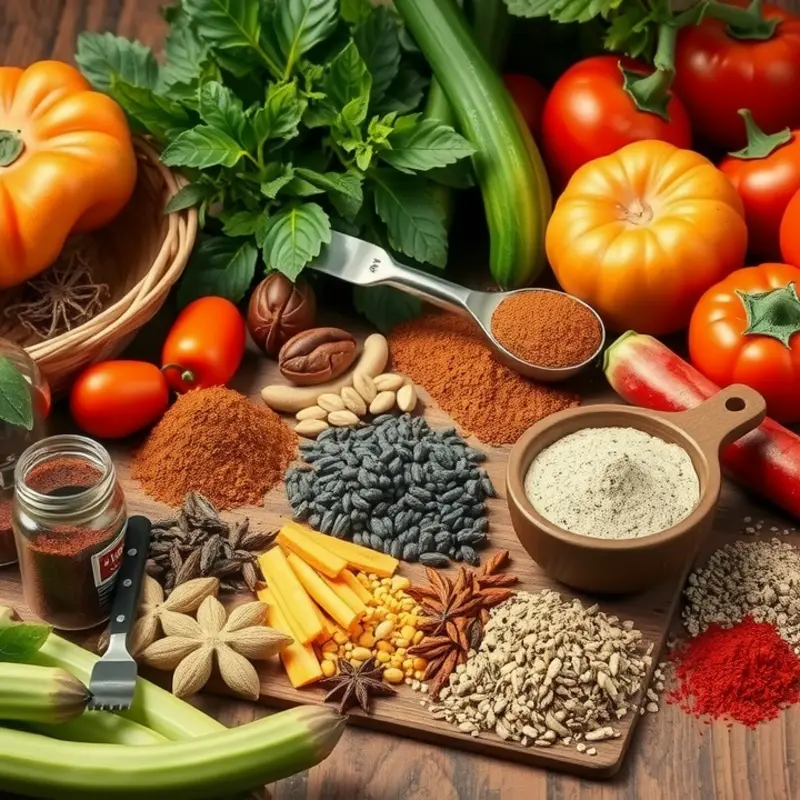Unlock the full potential of your culinary creations with natural flavor enhancements. Home cooks of all levels can benefit from these straightforward techniques that utilize herbs, spices, and fresh ingredients to elevate everyday dishes. Whether you’re preparing a weeknight meal or impressing guests at a dinner party, enhancing flavors naturally can take your cooking to the next level.
Harnessing the Power of Fresh Herbs

Fresh herbs offer a dynamic way to invigorate your culinary dishes, adding a layer of brightness and depth that is both immediate and complex. To fully exploit their potential, understanding how to select, store, and use these flavorful additions is crucial.
When selecting herbs, freshness is key. Opt for vibrant, unblemished leaves. Look for herbs that are aromatic when gently rubbed. For instance, basil should emit a sweet, peppery aroma, while rosemary should be pungent and woody.
Once purchased, proper storage ensures longevity. Soft herbs, like basil, parsley, and cilantro, fare best when treated like fresh flowers. Trim their stems and place them in a jar with water, covering loosely with a plastic bag before refrigerating, but leaving basil at room temperature. Hardy herbs such as thyme, rosemary, and sage can be wrapped in slightly damp paper towels and sealed in a plastic bag in the fridge. This simple preparation can extend their shelf life by several days.
Knowing the difference between soft and hardy herbs helps tailor their use in dishes. Soft herbs are typically delicate, ideal for garnishing or lightly incorporating at the end of cooking. Their flavors can dissipate quickly under heat. Hardy herbs stand up to longer cooking periods and work well in braises and stews, infusing dishes with robust, earthy scents.
Incorporating herbs effectively into your meals requires understanding their flavor profiles. Basil and cilantro pair wonderfully with tomatoes and citrus. Rosemary and thyme complement roasted meats and starchy vegetables like potatoes. Creating an herb oil or butter can provide an extraordinary flavor punch. Simply blend herbs with olive oil or softened butter, and drizzle or spread over finished dishes.
Consider the texture and flavor balance. Chopping herbs finely releases oils that intensify flavors, enhancing their integration into salads or pasta. For an infused touch, bruising the leaves slightly before use allows essential oils to permeate dishes brilliantly.
While familiar combinations offer a safe approach, branching out with unexpected pairings can yield surprising results. Adding dill to roasted carrots or tarragon to chicken elevates these ingredients by introducing novel dimensions of flavor.
Proper integration of herbs into cooking can reduce the dependency on salt as a primary seasoning. For more ideas on flavor enhancement without relying on salt, you can explore Flavor Boosters Without Salt.
Ultimately, herbs are a testament to how simplicity can transform cooking, elevating dishes with vibrancy and complexity that recalibrate the taste buds. Their power lies in their rich, aromatic presence, willing to lend brightness to any culinary creation.
Unlocking Flavors with Natural Seasonings

Harnessing the power of natural seasonings can transform ordinary dishes into extraordinary culinary experiences. Ingredients like lemon juice, garlic, ginger, and an array of spices offer vibrant flavors that elevate meals without adding unwanted salt or fat.
Lemon juice is a versatile acid that brightens up both savory and sweet dishes. It’s perfect as a finishing touch for grilled vegetables or salads and can even be used to tenderize meats. A squeeze of lemon over roasted chicken or fish provides a fresh burst of flavor that makes each bite memorable.
Garlic, with its rich and pungent aroma, is a staple in many cuisines. It can be used raw for a sharp intensity in dressings and dips or roasted to bring out its mellow sweetness. This versatility allows garlic to adapt to many flavor profiles, making it a must-have in your kitchen arsenal. When minced finely, it blends well into sauces, giving depth and complexity to the overall dish.
Ginger, a beloved root, offers a warm, spicy kick that pairs well with both sweet and savory options. Fresh ginger brings zest to stir-fries and soups, while dried ginger can enhance baked goods or spicy rubs. The key is to balance its bold taste with complementary ingredients—think ginger and honey for a soothing glaze or in tandem with soy sauce for a tangy marinade.
Spices unlock an array of possibilities. Whether it’s the heat of cayenne pepper or the earthiness of cumin, spices allow you to creatively layer flavors. You can create your unique spice blends by combining your favorites. For example, a mix of ground coriander, turmeric, and chili powder can lend a vibrant color and taste to curries and vegetable dishes.
Learning the art of flavor balancing is essential. A well-balanced dish has the right proportion of sweet, salty, sour, bitter, and umami elements. When using natural seasonings, start small and adjust incrementally. Taste as you go, adding a bit more of one seasoning or another to get that perfect harmony. Don’t hesitate to experiment—it’s through trial and error that the most delightful culinary surprises occur.
For a deep dive into enhancing flavors naturally, consider exploring similar topics such as Flavor Boosters Without Salt, which offers additional insights into creating appetizing dishes without relying on salt.
Incorporating natural seasonings into your cooking not only enhances taste but also encourages a healthier approach to meal preparation. Whether you choose to enliven a simple vegetable soup with a hint of ginger or brighten up a salad with a dash of lemon juice, these elements make every meal a flavorful adventure.
Final words
Enhancing flavors naturally not only elevates your dishes but also encourages a healthier approach to cooking. By incorporating fresh herbs and natural seasonings into your meals, you can create vibrant and enticing flavors that your family and friends will love. Remember, every little change can make a big difference in your culinary repertoire. Experiment with different ingredients and techniques, and enjoy the joy of discovering your personal cooking style. Let your creativity flow, and delight in the process of cooking delicious meals filled with natural flavor.







